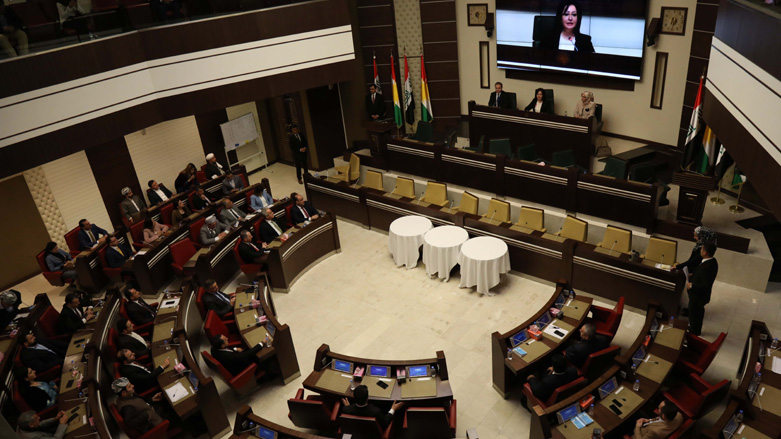Kurdistan official responds to critical comments about Baghdad-Erbil agreement

ERBIL (Kurdistan 24) – Hemn Hawrami, Deputy Speaker of the Kurdistan Region Parliament, expressed surprise on Tuesday at public comments made by his counterpart in the federal Iraqi parliament that were critical of a recent agreement between Erbil and Baghdad on longstanding disputes on finances and oil.
Kurdistan Region Minister Masrour Barzani announced late Saturday that Baghdad had agreed to a "partial restoration" of the region's share of the national budget that had been frozen months ago by the Iraqi Finance Ministry, signaling that the two sides are approaching at least an initial understanding on the divisive issues.
Read More: Iraq agrees to send Kurdistan part of its budget: KRG
"I am pleased to announce that Baghdad has agreed to pay IQD 320bn monthly as a partial restoration of our share of the federal budget," the premier said following a call with Iraqi Prime Minister Mustafa al-Kadhimi. The sum amounts to nearly $270 million.
First Deputy Speaker of the Iraqi Parliament, Hassan Al-Kaabi, then criticized the agreement, stating that Baghdad would be handing over the salary funds to the region "without auditing the financial control, handing over the oil revenues, and other revenues collected in the region to the Federal Ministry of Finance."
Hawrami, the second top official in the regional parliament, responded by saying, "The principles of the constitution are the basis for addressing any outstanding problems between the Kurdistan Regional Government and the federal government, which has not fully paid the region’s financial dues for many months, placing many heavy burdens on our citizens in the region, while ignoring the principle of Justice, Equality and the public interest. "
A 2019 deal with the Abdul Mahdi administration stipulated that the KRG must deliver Baghdad 250,000 barrels per day (bpd) in return for, among other things, securing the region's allocation in the Iraqi federal budget. The Kurdistan Region did not implement the oil handover, but then in late 2019, Erbil again renewed the agreement amid new negotiations.
"The recent agreement between Erbil and Baghdad, although it is temporary, paves the ground for a long-term agreement within the framework of the constitution, which is something that everyone should support, not fight," Hawrami continued, stressing that the agreement includes unifying procedures for border crossings, customs, and other points "that Baghdad raised during dialogues."
He also pointed out that sending 320 billion IQD per month is less than what Baghdad used to send, and that the aforementioned amount is for three months, and this amount has been allocated without the approval of 2020 budget, which is a figure based.
Hawrami added, "Al-Kaabi asked about auditing financial control, while the two sides' agreement requires the formation of a joint committee consisting of the Office of Financial and Federal Supervision and the region to handle the accounts and agree on methods of settling them for the year 2014 to 2020, provided that the region delivers all the information that Baghdad requested."
"The total sum that the regional government spends for salaries is 893 billion IQD," he continued, "which represents only 51 percent of the total of what the regional government pays in salaries."
"The region has not rejected any mechanism for auditing and controlling revenues according to the constitution," calling for "the necessity not to mislead public opinion and try to overturn the facts and conceal the fact that employees' entitlements have not been paid in the Kurdistan Region for four months, which is one of the constitutional duties of the federal government.
Hawrami called for "serious and fruitful cooperation to reach a balanced and fair agreement on the basis of the constitution, also to put an end to dealing with the Kurdistan Region on the basis of national discrimination," stressing that "everyone must review the content of the agreement well before making statements that are far from the facts."
"At a time when the Iraqi provinces are witnessing a waste of public money and the preoccupation of some of their officials with spending millions," he concluded, "employees, retirees, and martyrs' families have suffered for months, living without salaries. Their livelihoods were cut off under the weight of a dangerous health crisis that is not different from what the Iraq provinces are witnessing.”
Editing by John J. Catherine
